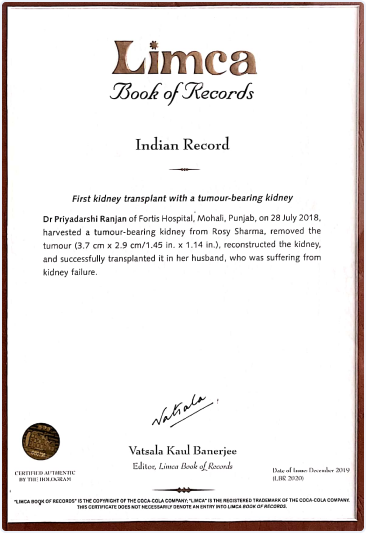
India’s highest qualified and experienced kidney experts

Our institution and surgeons achieved a remarkable milestone of performing 1000 kidney transplants successfully.

Highest single surgeon experience of blood group incompatible Kidney transplants

Dr. Priyadarshi Ranjan features in the prestigious LBR for first kidney transplant with tumour bearing kidney.


Led by Internationally acclaimed and renowned transplant surgeon, Dr. Priyadarshi Ranjan, Meliora Kidney Institute & Research Centre is known to deliver the best outcomes for patients suffering from all kinds of disorders associated with the kidney.


Unmatched infrastructure and state-of-the-art facilities
Cutting edge technologies

At Meliora, patient care takes the centre-stage and advanced treatment is exercised through an adept team of transplant surgeons and nephrologists. From cutting edge surgical techniques to the latest medical equipment, we have everything to ensure that our patients receive the treatment they deserve.


Highly Experienced Team
Commitment To Quality Care
Top Grade Infrastructure
World-Class Technology
Meliora Kidney Institute & Research Centre was started with a passion to ameliorate the sufferings of patients struck with the misfortune of kidney ailments. The vision of the healthcare professionals behind starting this super specialised institute was aligned to provide excellence in treatment of various kinds of kidney disorders by making use of cutting edge technology, enriched with experience, compassion and humility. We, at Meliora, are committed to raise the bar of treatment of such diseases by producing key research based on critical analysis of our own results in the field of nephrology and kidney transplantation.






1. What are the risk factors for kidney diseases?
You may have an increased risk for kidney disease if you have diabetes, suffer from hypertension, are older, have a severe heart disease, are obese, or smoke among other factors.
2. What are the symptoms of early kidney disease?
3. How to identify if a person has kidney problems?
4. Who should get screened for kidney problems and how frequently?
5. What is dialysis?
6. Can I travel if I am on dialysis?
Consult your doctor before planning your trip. Most patients receiving dialysis can travel if they have their medication and can get access to the dialysis facility. Our specialists can help you prepare the treatment plan.
7. Are Kidney Stones serious?
8. What is chronic kidney disease?
9. Is kidney transplant painful?
10. What are the ways of prevention?
Let’s stay in touch!